KU PharmTox Newsletter - Fall 2022
Note From the Chair
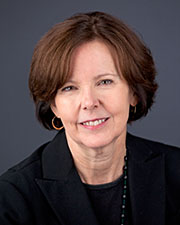 We are back in full swing on campus this semester with new graduate students and new research funding! This last year, three faculty were awarded new NIH grants including our newest young faculty member, Zijun Wang. We were also awarded a Research Rising grant through the University (with Mike Wolfe from Medicinal Chemistry as the Principal Investigator) which will support the initial hire of a new Mossberg Endowed Professor. We enjoyed a picnic to welcome our graduate students to the program in early October. Dr. Jeff Zigman from the University of Texas Southwestern Medical Center gave an excellent scientific seminar in mid-October, and we look forward to great scientific seminars from those interviewing for the Mossberg Professorship. I hope you enjoy the newsletter and consider visiting us in the future. We would love to have you come and share your stories with us either in the scientific seminar series or in our Beyond the Lab program that lets students learn about careers outside of academics. Stay well, be safe and have a terrific year!
We are back in full swing on campus this semester with new graduate students and new research funding! This last year, three faculty were awarded new NIH grants including our newest young faculty member, Zijun Wang. We were also awarded a Research Rising grant through the University (with Mike Wolfe from Medicinal Chemistry as the Principal Investigator) which will support the initial hire of a new Mossberg Endowed Professor. We enjoyed a picnic to welcome our graduate students to the program in early October. Dr. Jeff Zigman from the University of Texas Southwestern Medical Center gave an excellent scientific seminar in mid-October, and we look forward to great scientific seminars from those interviewing for the Mossberg Professorship. I hope you enjoy the newsletter and consider visiting us in the future. We would love to have you come and share your stories with us either in the scientific seminar series or in our Beyond the Lab program that lets students learn about careers outside of academics. Stay well, be safe and have a terrific year!
Nancy Muma
Department Chair
Graduating Student Updates
We are proud to announce the recent graduations of five students in the Pharmacology & Toxicology department.
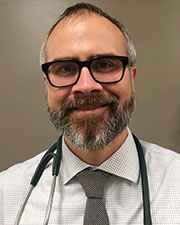
Jonathan Foster
Jonathan Foster earned a laboratory-based online MS degree in Fall 2021 with Dr. Muma as his KU mentor. Dr. Foster’s MS thesis was titled “Population Pharmacokinetic Analysis of Enrofloxacin and Its Active Metabolite Ciprofloxacin Following Intravenous Injection in Cats with Reduced Kidney Function” and was defended on Dec. 7, 2021. Dr. Foster is a veterinarian based in Washington, D.C. specializing in dialysis, internal medicine, nephrology and urology. You can read more about Dr. Foster in this newsletter.
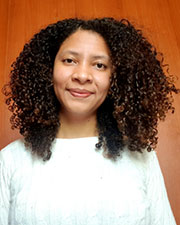
Lina Nerio
Lina Nerio graduated with her M.S. degree in Dr. Adam Smith’s lab. Ms. Nerio defended her MS thesis titled “Social Defeat and Oxytocin Regulation of Social Avoidance and Stress-related Signaling Proteins” on May 23. She is continuing her education in the Ph.D. program here in the Pharmacology & Toxicology department.
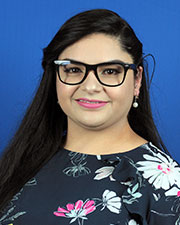
Aidyn Medina-Lopez
Aidyn Medina-Lopez received her Ph.D. degree in spring 2022 with Dr. Eduardo Rosa-Molinar as her advisor. Dr. Medina-Lopez defended her dissertation titled “Cell Death in Spinal Cord Injury: Which, Where, When and How” on May 3. She is lead applications scientist at Ronawk, Inc., located in Olathe, Kansas. Ronawk was founded by Dr. A.J. Mellot (a KU Bioengineering graduate) and Heather Decker (a former member of Dr. Rosa-Molinar’s Lab).
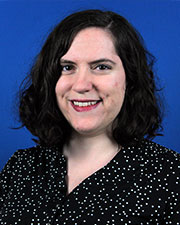
Maria Tickerhoof
Maria Tickerhoof completed her Ph.D. degree at KU with Dr. Smith as her mentor. Dr. Tickerhoof’s dissertation was titled “She Loves Me, He Loves Me Not: Regulation of Social Conflict-induced Changes in Social Behavior and Attachment by the Amygdala and Extended Amygdala” and she defended her dissertation on May 5. Dr. Tickerhoof is currently working as a postdoctoral researcher at Fordham University in Bronx, New York.
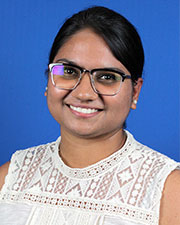
Sukhmanjit Kaur
Sukhmanjit Kaur earned her Ph.D. this past summer in the Pharmacology & Toxicology program under the direction of Dr. Rick Dobrowsky. Dr. Kaur defended her dissertation titled “Modulating Molecular Chaperones: A Novel Therapeutic Approach for X-Linked Charcot-Marie-Tooth (CMT1X) Disease” on July 25. She is currently working as a Scientist-1 for Garuda Therapeutics, Cambridge, Massachusetts. Garuda Therapeutics is a startup biotech company dedicated towards the production of “off-the-shelf" hematopoietic stem cells. Their aim is to reduce the need for donors for patients with blood disorders.
Congratulations to all these graduates!
Graduate Student News
Xin Zhang
Awards:
- Doctoral Student Research Fund (DSRF) (Post-Doctoral Candidacy), March 2022.
- Graduate Scholarly Presentation Travel Award by the KU School of Pharmacy Graduate Studies, August 2022.
- Department of Pharmacology & Toxicology Travel Award, September 2022.
Presentation:
“rhApoE2 Improves Neuronal Glycolysis, Synaptosomal Activity, and Spatial Recognition Memory in ApoE4 Models in an Age- and Sex-Dependent Manner” at the Society for Neuroscience conference in San Diego, California, November 2022.
Publication:
Xin Zhang, Long Wu, Russell H. Swerdlow, and Liqin Zhao, Opposing Effects of ApoE2 and ApoE4 on Glycolytic Metabolism Parallel the State of Cellular Health in Neuronal Aging: Opportunities to Cultivate Brain Resilience Against Alzheimer’s Risk. Cells (in revision).
Shuwen Yue and Yunwanbin Wang
Publication:
Shuwen Yue, Yunwanbin Wang, and Zijun Wang, Insulin-like Growth Factor 1 Regulates Excitatory Synaptic Transmission in Pyramidal Neurons from Adult Prefrontal Cortex. Neuropharmacology, 217: 109204, 2022.
Candidacy Oral Comprehensive Exam
The following Ph.D. students passed their Candidacy Oral Comprehensive Exam:
- Julia Doderer
- Yunwanbin Wang
- Shuwen Yue
- Tienju Wang
Mossberg Honors Symposium
Doctoral students gave presentations and presented posters at the 37th Mossberg Honors Symposium held January 12, 2022 in the KU School of Pharmacy.
Oral Presentations:
- Oliver L’Esperance - “Mapping Brain-Wide Synaptic and Cellular Activity Correlates of Visual Experience”
- Xin Zhang - "Targeting Glycolytic Metabolism to Increase Brain Resilience Against Alzheimer’s Risk”
Posters:
- Aidyn Medina-Lopez - “Insight Into Early Cell Death”
- Kun Jia, Jing Tian, and Tienju Wang - "Synaptic Mitochondrial Dysfunction in Aged Humanized Aβ Expressing Mouse Model”
- Shuwen Yue and Yunwanbin Wang - “Insulin-like Growth Factor 1 Decreases Excitatory Transmission via mGluR1-Mediated Glutamate Receptor Endocytosis in Prefrontal Cortex”
- Suraj Niraula, Julia Doderer, and Oliver L’Esperance - “In Vivo Imaging of Dendritic Excitatory-Inhibitory Synapse Imbalance in Mouse Models of Alzheimer’s Disease”
- Yunwanbin Wang and Shuwen Yue - “Activation of Prefrontal Cortex to Ventral Tegmental Area Projection Attenuates Early Social Isolation Stress-Potentiated Heroin Seeking”
New Graduate Students
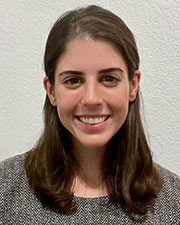
Sarah Bohl
Sarah is a new Ph.D. student in the program. She earned her B.S. degree from the University of Wisconsin-Madison. Ms. Bohl’s career choice was influenced by personal family medical issues and sparked her desire to join a profession that combats disease. She is also a medical student at KU and her goal is to become a physician-scientist.

Lina Nerio
Lina has transferred into our Ph.D. program after graduating from our MS program this past spring. Ms. Nerio is now working with Dr. Adam Smith and her research interest is in behavioral neuroscience.
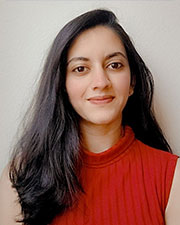
Riddhi Chawla
Riddhi is from Admedabad, India and is joining our master’s program. She received her bachelor’s degree from K.B. Institute of Pharmaceutical Education and Research in Gandhinagar, India. Riddhi is studying in Dr. Dobrowsky’s lab.
Welcome Picnic
The annual Pharmacology & Toxicology picnic was held at Broken Arrow Park on Oct. 6 to welcome our new students to the department. Students, faculty and staff had a chance to socialize and enjoy the wonderful fall weather together. Good food, fun and fellowship was enjoyed by everyone. A special thanks to Julia Doderer, Sarah Bohl and Oliver L’Esperance for organizing and cooking.
Lab Spotlight
Zhao Lab
Grant Funding:
Awarded a new R01 grant for the project entitled “Reshaping ApoE4 and Alzheimer’s Brains with ApoE2”, with a total budget of $2,931,935.
Lab Publications:
“Opposing Effects of ApoE2 and ApoE4 on Glycolytic Metabolism Parallel the State of Cellular Health in Neuronal Aging: Opportunities to Cultivate Brain Resilience against Alzheimer’s Risk.”
Zhang, X., Wu, L., Swerdlow, R.H., Zhao, L. Cells 2022 (in revision).
“Human Apoprotein E Isoforms Are Differentially Sialylated and the Sialic Acid Moiety in ApoE2 Attenuates ApoE2-Aβ Interaction and Aβ Fibrillation.”
Moon, H.J., Haroutunian, V., Zhao, L. Neurobiol Dis 164:105631:1-14, 2022.
Lab Poster Presentations at Upcoming SfN 51st Annual Conference:
- Moon, HJ., Herring, S.K., Rawal, P. and Zhao, L. “Brain Mitochondrial Clusterin (MitoCLU) Increases ATP Production via Regulation of ATP Synthasome.” In: The Society for Neuroscience 51st Annual Meeting, San Diego, CA, November 2022.
- Rawal, P., Moon, HJ. and Zhao, L. “Glial Expression and Immunomodulatory Role of Clusterin in the Brain.” In: “The Society for Neuroscience 51st Annual Meeting,” San Diego, CA, November 2022.
- Zhang, X., Moon, HJ., Siahaan, T.J. and Zhao, L. “rhApoE2 Improves Neuronal Glycolysis, Synaptosomal Activity, and Spatial Recognition Memory in ApoE4 Models in an Age- and Sex-dependent Manner.” In: “The Society for Neuroscience 51st Annual Meeting,” San Diego, CA, November 2022.
Invited Talks:
- “Brain Mitochondrial Clusterin (mitoCLU) Expression and Function,” The 2nd International Research Conference on Neurodegenerative Diseases, Omaha, NE, 2022.
- “Human ApoE Sialylation Modulates ApoE-Aβ Interaction and Aβ Fibrillation,” The 16th International Conference on Alzheimer’s & Parkinson’s Disease, Barcelona, Spain, 2022.
Professional Service:
- NIH SEP 2023/01 ZAG1 ZIJ-5 (J1) – “Lipids in Brain Aging and Alzheimer’s Disease (AD) and its Related Dementias (ADRD)”, October 2022.
- NIH SEP 2022/05 ZRG1 EMNR-A (53) R – “The Intersection of Sex and Gender Influences on Health and Disease”, March 2022.
New Lab Members:
- Sophia Khatri joined the lab in May 2022 as an assistant researcher.
- Sarah Bohl joined the lab in July 2022 as a Ph.D. graduate student.
First Distance Laboratory-Based Online Master of Science Degree Earned
 Jonathan (JD) Foster has earned the first online laboratory-based Master of Science (M.S.) degree in the Pharmacology & Toxicology Department. The title of his master’s thesis was “Population Pharmacokinetic Analysis of Enrofloxacin and Its Active Metabolite Ciprofloxacin Following Intravenous Injection in Cats with Reduced Kidney Function.”
Jonathan (JD) Foster has earned the first online laboratory-based Master of Science (M.S.) degree in the Pharmacology & Toxicology Department. The title of his master’s thesis was “Population Pharmacokinetic Analysis of Enrofloxacin and Its Active Metabolite Ciprofloxacin Following Intravenous Injection in Cats with Reduced Kidney Function.”
The laboratory-based online M.S. degree program in Pharmacology & Toxicology provides advanced training in molecular, cellular and organ systems pharmacology and toxicology and scientific writing. Dr. Nancy Muma, department chair, was Foster’s on-campus advisor while he was a student. Foster received a grant from the AVMF/Veterinary Pharmacology Research Foundation to support his master’s thesis research work.
37th Annual Mossberg Honors Symposium and Poster Sessions
The 37th Annual Mossberg Honors Symposium was held on Wednesday, Jan. 12 in the School of Pharmacy, Room 2040.
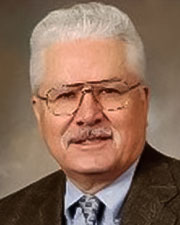 Dr. Daniel Acosta Jr. gave the keynote address titled “My Career Journey.” His address focused on the barriers and obstacles he encountered during his career as a professor and administrator, and provided some lessons for new academic, government and industrial scientists.
Dr. Daniel Acosta Jr. gave the keynote address titled “My Career Journey.” His address focused on the barriers and obstacles he encountered during his career as a professor and administrator, and provided some lessons for new academic, government and industrial scientists.
Dr. Acosta was Dean Emeritus, Winkle College of Pharmacy, The University of Cincinnati, former Deputy Director of the National Center for Toxicological Research, The Food and Drug Administration, and a KU Pharmacology & Toxicology department graduate. Dr. Acosta was the Inaugural Graduate Program Distinguished Alumnus.
In addition to the keynote address, students and post-docs from each School of Pharmacy department gave oral research presentations. A poster session took place in the School of Pharmacy Building Atrium.
From Our Alumni - Long (Wu) McFarlin, Ph.D.
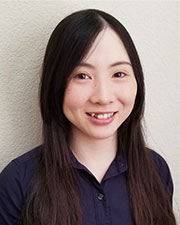
I started my graduate study in the Department of Pharmacology & Toxicology in 2011 with a background in pharmaceutical science and a keen interest in preclinical drug research. I was co-mentored by Dr. Shidu Yan and Dr. Liqin Zhao. My work in the Yan lab focused on understanding mitochondrial dysfunction as a major culprit in Alzheimer’s disease and diabetes. In the Zhao lab, I studied the risk mechanisms and molecular pathways underlying perturbed bioenergetic metabolism in sporadic Alzheimer’s disease.
After graduation, I did my first postdoctoral training in the Department of Neurology at the University of California, San Francisco (UCSF), where I continued to explore biogenetics and oxidative signaling, particularly focused on neuronal NADPH oxidase in neurological diseases. Although I had a productive two years at UCSF and I enjoyed working on the topics, I wanted to expand my toolkit for research, especially induced Pluripotent Stem Cells (iPSC), genome editing, and omics. Luckily, I was offered a postdoctoral fellow position at the Buck Institute for Research on Aging by Dr. Lisa Ellerby. The lab leverages new technologies including patient-derived iPSC, multi-omics, single cell analysis, and genome editing with CRISPR/Cas9 to better understand the fundamental mechanisms that lead to age-related neurodegenerative diseases and identify new therapeutic targets for these diseases. During my time at the Buck Institute, I learned and mastered these techniques and excelled as an independent researcher. While I enjoy the ”proof of concept” problem solving and the freedom of intellectuality in academia, I have decided to transition into the industry where I can apply my scientific training to drug discovery and make an impact on improving a patient’s life.
My first industry job was a research scientist in the Neuroscience Department at PTC Therapeutics, a pharmaceutical company focused on the development of small-molecule drugs and gene therapy for rare disorders. I supported multiple programs by developing phenotypic assays using patient-derived CNS cells for compound screening. The job was demanding yet rewarding. I gained familiarity with new technologies including the operation of the automated liquid handler and devices for high-throughput screening. I started to build and expand my professional network in the industry. Most importantly, I learned to ”flip” my mindset from academic to industrial. The first thing I learned is that industry is highly collaborative. Due to the complex nature of drug discovery, there is much collaboration across multiple functional areas and disciplines. I often sit in on the biweekly or monthly meetings with colleagues from the Department of Chemistry, Bioanalysis, PK/PD, or external collaborators to discuss projects’ progress and timelines. Another important change in my mindset is team orientation. Instead of thinking about what I can achieve, I start to focus more on what I can do to help the team succeed. I trained junior members on new techniques, provided scientific expertise when the team needed it, and introduced resources and strategies that could improve team performance. Later I took a jump from PTC Therapeutics to a biotechnology startup called Rarebase, which partners with patient organizations on translational therapeutic discovery and development for rare diseases. The major considerations for switching include company culture, opportunities for career growth, and the ability to make visible impacts. At Rarebase, I am working on establishing patient-derived iPSC-based cellular platforms for disease modeling and drug screening. iPSCs have recently gained prominence in disease modeling by recapitulating identical genetic and phenotypic aberrations, enabling the demonstration of personalized medicine. I am excited about applying my scientific expertise to help patients through personalized drug screening and advancing the development of novel therapies for rare genetic disorders.
Looking back, my time spent at KU helped to shape my scientific career. I learned how to conduct research—generate scientific questions and design experiments to address questions. The presentation skills I obtained through the weekly department seminar have prepared me for job interviews and professional presentations. In the journal club held weekly, we discussed peer-reviewed scientific articles, which facilitated critical thinking and improved scientific communication skills. I also developed a deep appreciation for the ‘Beyond the Lab’ career development program, which provided opportunities for us to explore alternative science careers. Graduate school also taught me to be resilient, adaptable and efficient in time management, which is crucial when facing challenges of fast project turnover and meeting deadlines in the industry. I am grateful for the training and mentoring all the faculty provided.
Heng Du Receives RO1 Grant
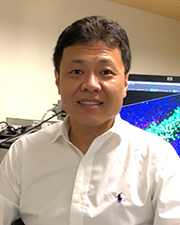 Congratulations to associate professor Heng Du on receiving an RO1 grant from the National Institutes of Health entitled “mtDNA Leakage and Sting-Dependent Microglial Innate Immune Response in Alzheimer's Disease.”
Congratulations to associate professor Heng Du on receiving an RO1 grant from the National Institutes of Health entitled “mtDNA Leakage and Sting-Dependent Microglial Innate Immune Response in Alzheimer's Disease.”
The grant is funded for $2,374,430 and runs from 2022 to 2026.
This funded project addresses a novel mechanism of microglial activation and the associated brain pathology in Alzheimer's disease. The results will provide a novel strategy for the treatment of Alzheimer’s disease and will impact our understanding of brain pathology in other neurodegenerative diseases such as Diffuse Lewy Body disease and Down syndrome.
Eduardo Rosa-Molinar Named AAAS Fellow
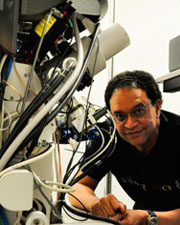 Eduardo Rosa-Molinar, professor of pharmacology and toxicology, has the honor of being named a 2022 fellow of the American Association for the Advancement of Science (AAAS). He joins this year’s group of scientists, engineers and innovators identified for their scientific and social accomplishments.
Eduardo Rosa-Molinar, professor of pharmacology and toxicology, has the honor of being named a 2022 fellow of the American Association for the Advancement of Science (AAAS). He joins this year’s group of scientists, engineers and innovators identified for their scientific and social accomplishments.
All nominees are AAAS members and are nominated by three previous AAAS fellows, members of the AAAS section steering committee or by the CEO of the AAAS.
After review by the steering groups, the final vote is made by the AAAS Council. Dr. Rosa-Molinar’s nomination was based on two outstanding areas of contribution. First, on his important approaches to diminish charge artifacts in electron microscopic imaging through innovative tools and methods. Second, for his mentoring future scientists and innovators from the BIPOC (Black, Indigenous and people of color) community.
Adam Smith Promoted to Associate Professor and Granted Tenure
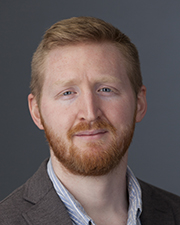 We are pleased to announce that Dr. Adam Smith has been promoted to associate professor of pharmacology and toxicology and granted tenure. Dr. Smith received his Ph.D. in Neuroscience from Florida State University and completed a postdoctoral fellowship at the National Institute of Mental Health. Dr. Smith joined our department in 2016.
We are pleased to announce that Dr. Adam Smith has been promoted to associate professor of pharmacology and toxicology and granted tenure. Dr. Smith received his Ph.D. in Neuroscience from Florida State University and completed a postdoctoral fellowship at the National Institute of Mental Health. Dr. Smith joined our department in 2016.
Dr. Smith’s research focuses on the emerging field of social neuroscience and seeks to expand our knowledge of social stress. Dr. Smith is working to discover novel targets for therapeutics in order to improve symptoms of mental health disorders associated with sociality.
Zijun Wang Earns $2.3M NIH Award to Study Opioid Addiction
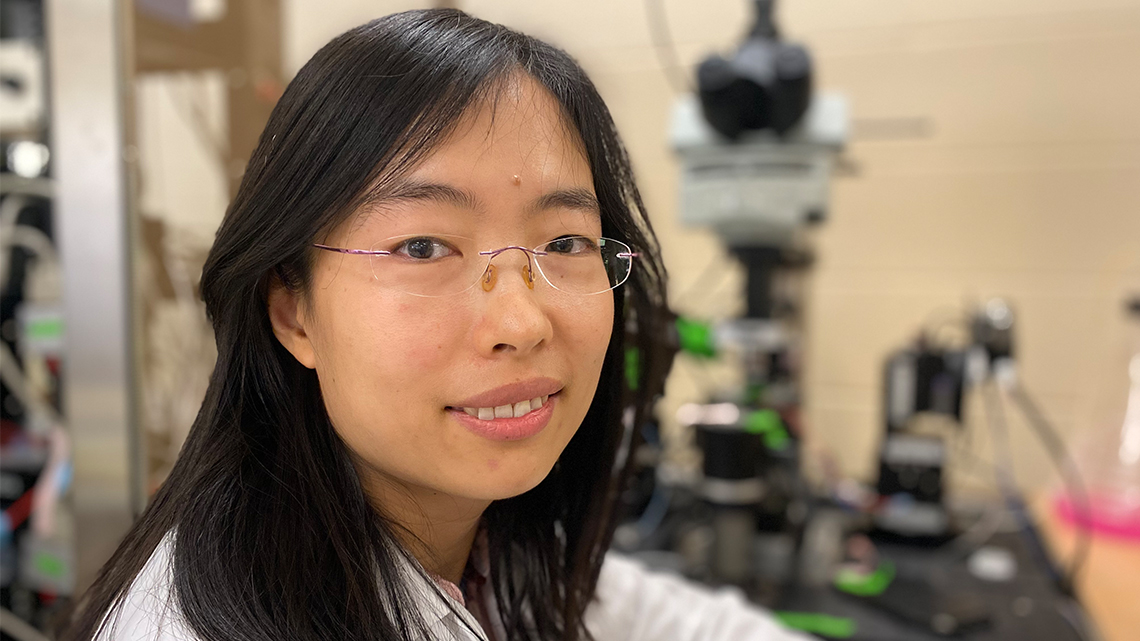 Assistant professor of pharmacology and toxicology Zijun Wang is taking a novel approach to the prolific problem of opioid addiction in America. With a $2.3 million grant from the National Institute on Drug Abuse, Wang will research the implications of the DNA break-and-repair process in opioid use disorder.
Assistant professor of pharmacology and toxicology Zijun Wang is taking a novel approach to the prolific problem of opioid addiction in America. With a $2.3 million grant from the National Institute on Drug Abuse, Wang will research the implications of the DNA break-and-repair process in opioid use disorder.
Wang’s work is based on the premise that opioid addiction is a psychiatric disorder caused by molecular changes in the brain that alter behavior.
“Drug addiction is not a moral failing,” said Wang, assistant professor of pharmacology & toxicology. “In terms of addiction, the reward pathway in the brain is hijacked by repeated drug exposure. Drug-induced structural changes result in many abnormal behaviors, including reduced inhibitory control that prevents someone from avoiding behaviors with negative consequences.”
Liqin Zhao Receives RO1 Grant
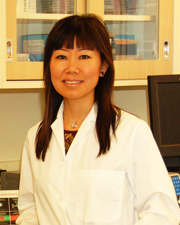 Dr. Liqin Zhao, associate professor of pharmacology and toxicology, together with Dr. Teruna Siahaan, professor of pharmaceutical chemistry, received an RO1 grant titled “Reshaping ApoE4 and Alzheimer’s Brains with ApoE2.”
Dr. Liqin Zhao, associate professor of pharmacology and toxicology, together with Dr. Teruna Siahaan, professor of pharmaceutical chemistry, received an RO1 grant titled “Reshaping ApoE4 and Alzheimer’s Brains with ApoE2.”
The grant from the National Institutes Health is funded for $2,931,935 and runs from January 2022 to November 2026.
This project seeks to translate the protective effects of ApoE2 into a therapeutic approach to help the brain stave off Alzheimer’s Disease. Humans possess three major genetic variants of apolipoprotein E (ApoE)—ApoE2, ApoE3, and ApoE4—that confer differential susceptibility to AD. ApoE4 is presently established as the most potent genetic risk factor for the late-onset sporadic form of AD, with over 65% of AD patients carrying at least one copy of ApoE4, whereas ApoE2 is recognized as an exceptionally protective genotype against AD. Historically the ApoE field has focused mainly on ApoE4, whereas ApoE2 has been largely ignored. Dr. Zhao’s work on the protective mechanisms associated with the ApoE2 genotype has positioned them to advance these findings into a novel therapeutic opportunity for AD.
The overall goals of the project are to establish the plausibility of targeting brain metabolic resilience as a disease-modifying strategy and generate proof of concept as to whether a ApoE2-based protein therapy can potentially be developed into an effective and safe intervention for Alzheimer’s Disease.
Scientific Seminar Series
The KU Department of Pharmacology & Toxicology's Scientific Seminar Series features prominent researchers from KU, the United States, and the world.
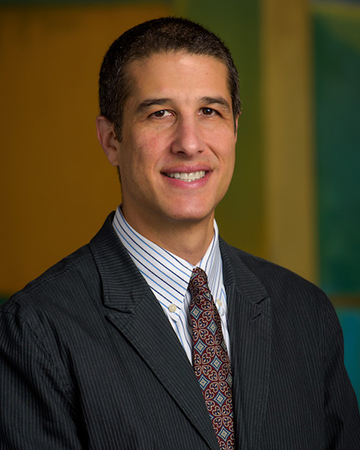
Jeffrey Zigman, M.D., Ph.D.
Professor, Internal Medicine Department, UT Southwestern Medical Center, Dallas, Texas
The Ghrelin System and Body Weight
Tuesday, October 18, 2022
Dr. Zigman’s research aims to understand the neuro-hormonal framework that underlies metabolism. His lab focuses on how the gastrointestinal hormones (i.e., ghrelin and LEAP2) interact with the brain, peripheral nervous system and other peripheral organs. These include pancreatic islets and the pituitary to control eating, body weight, blood glucose, responses to exercise, islet function and mood. The lab studies such things as obesity, diabetes, hypoglycemia, cachexia, Prader-Willi Syndrome, depression, and amyotrophic lateral sclerosis.
Master’s degree student, Riddhi Chawla, remarked, “I liked the connection of ghrelin hormone to the cancer cachexia and results were also very fascinating in Dr. Zigman's seminar. They are working in multi-dimensional area of ghrelin, which could help with clinical treatments in the near future.”
Dr. Zijun Wang stated, “Dr. Zigman’s research on how ghrelin and LEAP2 regulate bodyweight is very important considering the epidemic of obesity and metabolic syndrome. The disruption of the connection between central nervous system and peripheral system underlies the pathophysiology of these diseases. Ghrelin and LEAP2 are part of the key hormones that serve as messengers to provide feedback from peripheral system to the brain. Understanding the biological function of Ghrelin and LEAP2 will help us to put the puzzle together and find novel cure for diseases with disrupted bodyweight.”
Tienju Wang, Ph.D. student, indicated, “It was great to hear from Dr. Zigman about his novel research and how gut hormones relate to CNS function. He is a captivating speaker and a fascinating individual to hold a conversation with.”
Faculty Recent Publications
Synthesis and Evaluation of 3'- and 4'-substituted Cyclohexyl Noviomimetics that Modulate Mitochondrial Respiration.
Meka PN, Amatya E, Kaur S, Banerjee M, Zuo A, Dobrowsky RT, Blagg BSJ. Bioorg Med Chem., Sep 15;70:116940, 2022.
Nonobese Male Patients with Alzheimer’s Disease are Vulnerable to Decrease in Plasma Leptin.
Tian J, Wang T, Jia K, Guo L, Swerdlow RH, Du H. J Alzheimers Dis., 88(3):1017–1027, 2022. doi:10.3233/JAD-220447.
Small-Molecule Disruptors of Mutant Huntingtin−Calmodulin Protein−Protein Interaction Attenuate Deleterious Effects of Mutant Huntingtin.
Kapadia K, Trojniak AE, Guzman Rodriguez KB, Klus NJ, Huntley C, McDonald P, Roy A, Frankowski KJ, Aube J, Muma NA. ACS Chem Neurosci., 13(15):2315-2337, 2022.
Recent Advances in Iron Homeostasis and Regulation - A Focus on Epigenetic Regulation and Stroke.
Shi H, Almutairi M, Moskovitz J, Xu YG. Free Radic Res., 55(4):375-383, 2021.
Protective Effects Against the Development of Alzheimer's Disease in an Animal Model Through Active Immunization with Methionine-Sulfoxide Rich Protein Antigen.
Smith AS, Gossman KR, Dykstra B, Gao FP, Moskovitz J. Antioxidants (Basel). Apr 13;11(4):775, 2022.
Insulin-like Growth Factor 1 Regulates Excitatory Synaptic Transmission in Pyramidal Neurons from Adult Prefrontal Cortex.
Yue S, Wang Y, Wang Z. Neuropharmacology, 217: 109204, 2022.
Human Apoprotein E Isoforms are Differentially Sialylated and the Sialic Acid Moiety in ApoE2 Attenuates ApoE2-Aβ Interaction and Aβ Fibrillation.
Moon H.J., Haroutunian V., Zhao L. Neurobiol Dis., 164:105631:1-14, 2022.
The Support of Our Donors Makes All the Difference
Thank you for your interest in supporting the Pharmacology & Toxicology Department. Your support allows the Department to provide resources for students and can make a profound impact no matter the size. Even small amounts given over time can accumulate to create substantial resources for the department.
Donations allow us to continue the excellence you have come to expect. Much needed donations to the Dr. Wenzel Scholarship Fund support our Ph.D. students in their first semester, allowing them to rotate through several labs before choosing one for their dissertation research.
For a lasting impact on the department, major gifts can establish endowed funds that can be named for you or for someone else and provide financial support in perpetuity.
To make a donation, visit KU PharmTox Give or contact our development director, Beth Bucklin, at bbucklin@kuendowment.org or 785-832-7477.
Pharmacology & Toxicology | University of Kansas School of Pharmacy
Malott Hall, Room 5064, Wescoe Hall Drive, University of Kansas, 66045
pharmtox@ku.edu | 785-864-4002